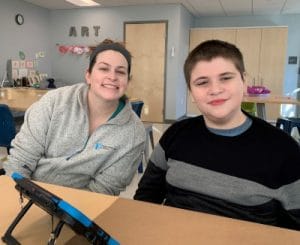Pandemic affects everyone, especially autistic kids

Children with autism at The New England Center for Children are having to adapt to daily new routines with the help of staff. (Contributed photo)
Coronavirus, or COVID-19 , has ground most of daily life to a halt for weeks. Small businesses are shut down. Children aren’t going to school. People are confined to their homes clinging tightly to toilet paper and hand sanitizer.
Globally, there are more than two million cases of the virus with tens of thousands of deaths. The United States has hundreds of thousands of cases with hotspots in areas of New York and Massachusetts and growing pockets in the South and Midwest. But when it comes to issues surrounding the coronavirus, there is one thing that’s been largely overlooked: kids with autism. They need one-on-one care and education. This pandemic has made that nearly impossible.
For children who thrive on structure and routine, going with the flow is not an easy request. Upending a carefully constructed schedule can make them unsettled and even aggressive. Kids on the spectrum have a broad range of behavioral and learning disabilities—some are more high functioning while others are completely non-verbal.
How do you make a non-verbal child understand that they can’t leave their home for the foreseeable future?
Based in Southborough, Mass., The New England Center for Children (NECC) knows first-hand how difficult this epidemic has been for families and their staff. NECC Clinical Director Jessica Sassi, Ph.D, BCBA-D, LABA, said they’ve been working hard to help families adapt to this change.
“Autistic kids have a preference for sameness and predictability. You need to help them make a transition into a new routine,” she said. “Because this is such a shift, there will be predictable anxiety, disappointment, and acting out or disruptive tantrums.”
NECC operates 15 homes across six towns within the greater Boston area serving close to 140 children, teenagers, and young adults. Some kids are registered in their day school while others are residential.
Right now, the residential children can’t leave the premises. At best, they can reach their families through FaceTime or Zoom. For Roberta Biscan whose 15-year-old son is at the residential school, that’s been particularly challenging.
“I can’t even see my own son,” she said. “He continually asks, ‘Why can’t I come home?’ It’s heartbreaking.”
Biscan, who works for Dedham-based Riverside Community Care helping mentally ill patients, knows that staying in residence is the safest thing right now. But her son doesn’t understand why it has completely disrupted his schedule.
He has come home every single weekend—until now. As a single parent, she doesn’t know how she’d manage with her job and her other kids if her son had to be dismissed from the residential school because of the virus. As it is, she knows a number of families are doing their best to adjust with autistic children at home and it hasn’t been easy.
“Kids on the spectrum really rely on what’s coming next,” she said. “Without structure, they get dysregulated. They can’t predict. They are literal, concrete thinkers. They need consistency. As much as they may try, parents can’t provide that all the time.”
Biscan said she can’t imagine how tough this situation must be for the staff at NECC. Joshua Jackson, a program specialist who works with teens at NECC’s residential school, could tell her. They’ve tried to maintain structure and routine as much as possible. They’ve developed specific schedules so that each student has an hourly activity including academics and behavioral programming.
While that’s working for now, there’s a downside. Some of the kids have had a difficult time not going to school. Part of the problem is there’s no end date. No one is sure when kids will be going back. But Jackson said there is a silver lining.
“It’s made things a little simpler. It has taken out the variables that happen during the day like going into the classroom, going to the gym, or the pool,” he said. “I have had some students decrease their challenging behavior.”
Both Biscan and Jackson noted that even if the kids on the spectrum get used to this routine, they will most likely have to reimplement some lessons once they return. As Biscan put it, no one was prepared for this situation to turn out the way it did and it will have repercussions.
“I think when this is all over, kids will struggle getting back to their routine because it will be different than the one they’ve gotten used to at home,” she explained. “These kids will have significant regression, academically and behaviorally. Everyone is going to have to start over.”
Sassi agreed. “There is a risk of regression if we don’t continue to maintain what they’ve learned. It’s going to be a challenge. Some kids may be able to stay on point but other kids may have more difficulty. We may have to recover some territory when we come back.”
